Make it no.
A few weeks ago, we introduced our son to Star Trek by way of a pinball machine. The machine included audio dialogue clips from Star Trek (2009) and Star Trek: Into Darkness and he was instantly curious to watch them. As of today, he has seen all of the so-called Kelvin trilogy (the three newest films), Star Trek II, III, and IV, and several episodes of the original series (including the original Khan episode). And he loves them.
My wife and I could not be prouder since we both love Star Trek. Well, some Star Trek, that is. We are both huge fans of The Next Generation and we will start in on those episodes and movies with our son after we watch Star Trek V and VI. However, we will not be encouraging him to watch any of the series that came after The Next Generation. While Deep Space Nine was watchable at times, Voyager was not and Enterprise almost made my eyes bleed (I couldn’t even finish the first episode it was so bad).
Originally, Star Trek was envisioned by Gene Roddenberry as an idealistic and hopeful future of the human race where exploration, community, and knowledge drove people. Deep Space Nine started to change that (and Voyager and Enterprise slammed it home), focusing much more on the shittier traits of humans like war, greed, and genocide. Not coincidentally, Gene Roddenberry died two years before Deep Space Nine aired and thus morphed Star Trek into a pessimistic and cynical look at the human race.
It is not hyperbole to note that Enterprise all but killed the Star Trek franchise until J.J. Abrams resurrected it with Star Trek years later. While still somewhat dark, Abrams at least tried to reinject that hope and idealism back into the franchise. Unfortunately, CBS decided to create two new Star Trek series for television, Discovery and Picard. At first, I really wanted to check out Discovery, if for no other reason than Star Trek, but did not feel like subscribing to CBS All Access for a single show. Then, Picard came along and, being a huge TNG and Patrick Stewart fan (as well as CBS offering free trial access to their service), we jumped straight into Picard. You know what they say about looking before you leap? Make sure your parachute isn’t actually a knapsack.

I should have known better than to put my hopes of a good science-fiction show on a network that is ninety-five percent crime procedurals and five percent continuing to beat the dead horse that was The Big Bang Theory (Young Sheldon). It also would have been informative to know that the writing credits include Akiva Goldsman and Alex Kurtzman. Their collective filmography ranges from Goldsman’s moving, Oscar-nominated A Beautiful Mind and Kurtzman’s excellent television show Fringe to a collection of crap that far outweighs the good, including Batman & Robin (Goldsman), 2017’s The Mummy (Kurtzman), and two Transformers sequels (Kurtzman and Goldsman). Of course, with the coronavirus pandemic forcing us to stay home, I still would have given Picard a chance knowing those two were behind it.
(SPOILER ALERT – I will be covering bits of all of the episodes throughout Picard, including the finale. You’re welcome.)
Picard begins eighteen years after the events of the last TNG film, Nemesis, in which we see Lt. Commander Data (Brent Spiner) die. Jean-Luc Picard (Stewart) is a retired admiral, living out his final days tending to a French winery while having recurring dreams of Data. Meanwhile, in another place on Earth, Dahj (Isa Briones) is about to celebrate with her boyfriend her acceptance to a robotics university when a couple of mercenaries crash into her apartment, kill her boyfriend, throw a hood over her head, and question if she has been “activated.” This attack activates her â which apparently means she suddenly has amazing combat skills â she kills the mercenaries, then sees an image of Picard in her head. While not exactly having a Star Trek feel, this is at least an intriguing opening to the story.
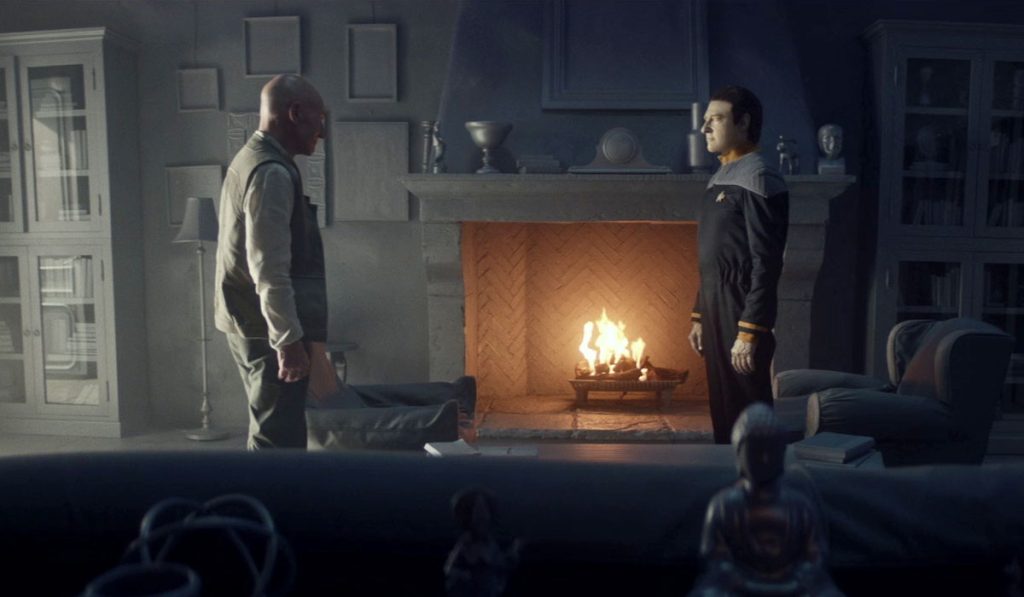
While Dahj makes her way to find Picard, we get a quick synopsis of the eighteen years we missed. Taking the Romulan supernova element from Abrams’ Star Trek, we learn Picard spearheaded an attempt to evacuate Romulus, but failed when a bunch of androids on Mars went rogue, destroying all the ships being made for the evacuation and killing thousands of people working there. This led to the Federation abandoning the rescue effort and banning synthetic life forms. Make sense? Of course not. Even after several episodes and more detailed flashbacks, my wife and I did not understand the connection between the Romulan evacuation and the android killing spree until I read a review pointing out that Mars was where they were building the evacuation fleet. The story only goes downhill from there, but it takes until episode two to start its plummet.
To be fair, the story was still intriguing through the end of the first episode. Picard concludes and informs Dahj that she is an android and that she contains a shred of Data’s essence in her. Then, Romulans kill Dahj by spitting acid on her. Okay, that part was just stupid, but it sets up the rest of the story. Picard also learned that Dahj had a twin sister, Soji. Setting aside the absurdity of lethal spit and the redundancy of Data’s essence as a motivating factor for Picard, the main story is Picard’s quest to rescue Soji before Romulans can kill her too. Except, he doesn’t know where she is. But we do – a captured Borg cube. No credit awarded for predicting CBS would go back to the Borg well.
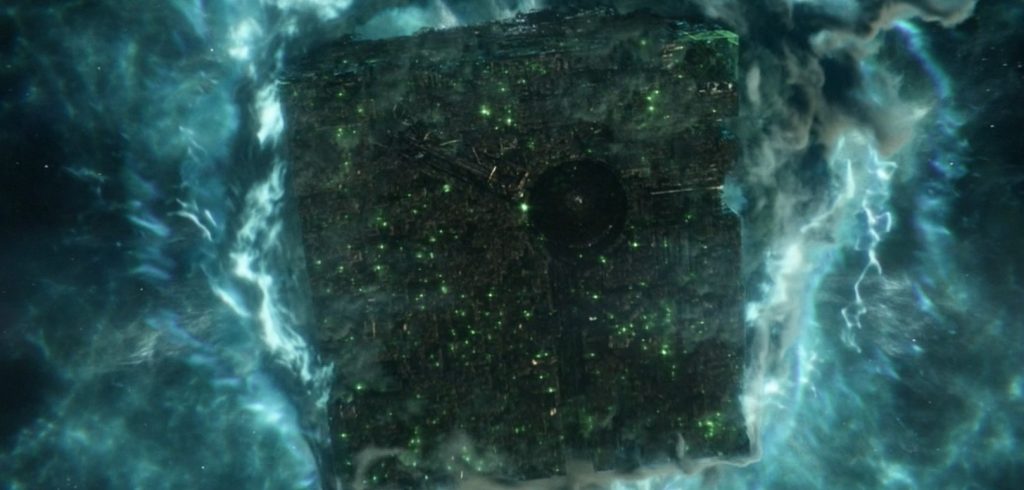
Much of episode two is composed of elements that represent the worst of most modern dramas. Soji starts up a relationship with a Romulan named Narek (Harry Treadaway), including a gratuitous bedroom scene. Narek is also clearly a villain (even before it is revealed during this episode), emphasized by Soji several times and episodes later, commenting that she still doesn’t know what his job is (or even last name). In other words, Soji is a slutty and clueless secret killer android. Yeah, this is definitely not Star Trek.
We also meet Commodore Oh (Tamlyn Tomita), head of Star Fleet security despite clearly being a Romulan. I think we’re supposed to believe Oh is Vulcan, but she shows emotion almost immediately and doesn’t look like a Vulcan. The episode concludes with Oh telling her subordinate, Narissa (Peyton List), to stay on mission and kill Soji. Lastly, we meet Raffi (Michelle Hurd), an ex-Starfleet officer and former friend of Picard who is arguably the worst character of any Star Trek film or show…and keep in mind this is a universe that features Ferengis. Raffi vapes, lives in a trailer in the desert, is apparently sometimes a drug addict, is a conspiracy theorist, and is estranged from her family (including her son) due to her life falling apart. The worst thing about her though – she refers to Picard as “JL.” Just, no.
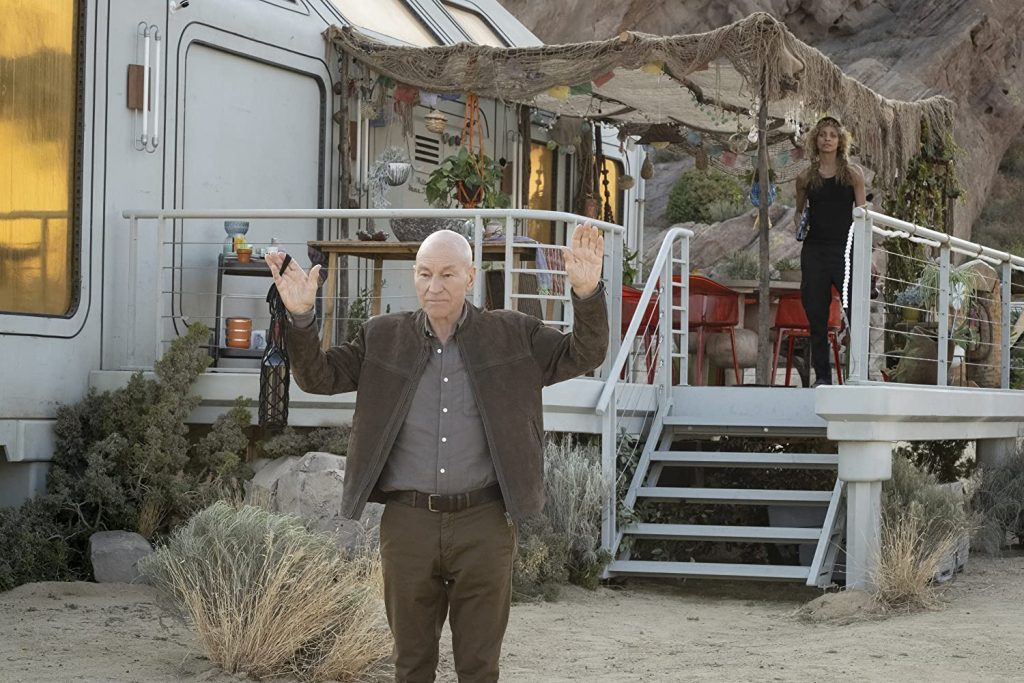
If you were keeping score in the last paragraph, we have a forced and rushed romance (the entire season takes place over the course of two weeks), a mole in the government, a drug addict with a broken family, and unnecessary acronyms. That is on top of secret killer androids, kick-fight scenes, a Federation that is okay with the extinction of other species, and the creation and destruction of an untold and presumably large population of androids in a five-year period despite the Federation never being able to create androids. Two episodes in!!
Until the final two episodes, the story wanders all over the place after Picard assembles a ragtag crew and ship to search for Soji. In addition to Raffi, there is Dr. Agnes Jurati (Alison Pill) – a synthetic robotics specialist (despite synthetic lifeforms being banned a decade earlier), Elnor (Evan Evagora) – a Romulan ninja (seriously, he even has a man bun) acting as Picard’s bodyguard, and Captain Cristobal Rios (Santiago Cabrera) – captain and owner of the freighter Picard charters for the mission (Picard went to Starfleet first, but was told to go fuck himself in almost those exact words). Of all of these characters, Captain Rios is the only one who is even mildly interesting, but we eventually find out that he too is damaged goods (contrived as him falling in love with a Dahj/Soji android years earlier and having his heart broken). Can someone please tell me who and when it was decided that all characters in all shows must be damaged to be interesting?
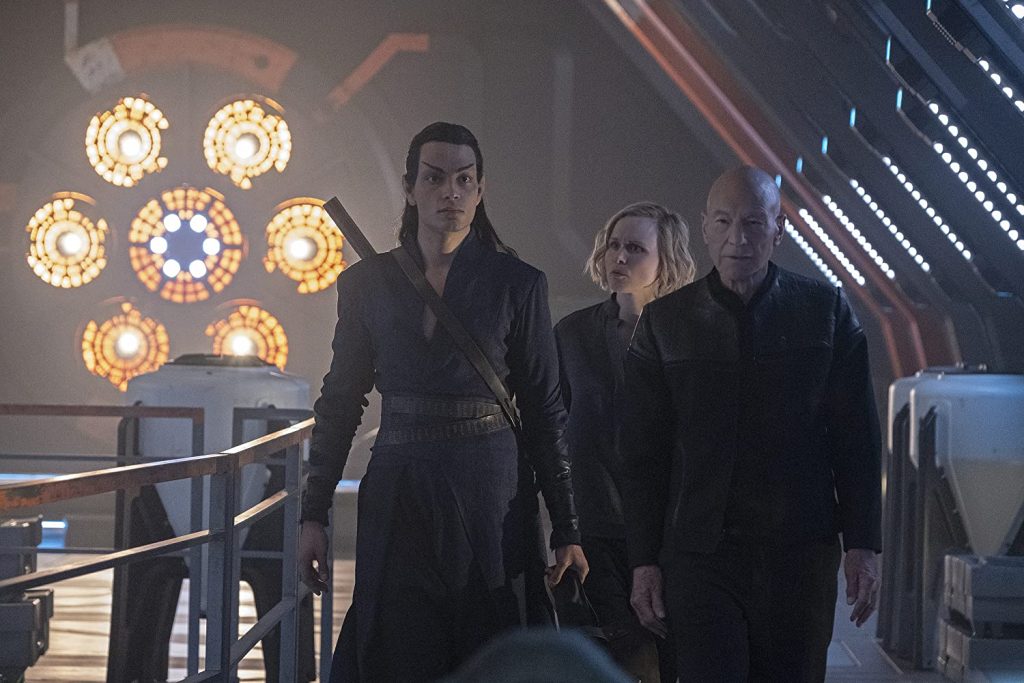
The final two episodes end with the discovery of a hidden android colony led by Dr. Soong’s son, Alton (Brent Spiner). Yes, that Dr. Soong. Turns out there is another Soji/Dahj android (Sutra) and this one wants to open a portal to somewhere (don’t ask) to allow a murderous, ultra-advanced, million-year-old, synthetic, space octopus to come through and kill all biological life. It also turns out that Oh and Narissa are part of a secret and ancient Romulan sect that new about the space octopus through a prophecy warning them to kill all synthetic life forms lest those life forms try to call said octopus. The only question you should have at this point is if I had a little too much LSD in the sixties.
What started out as a fairly simple story with Star Trek trappings turned into the rejected plot of a Transformers sequel. And that is just the story. The production value of the show was not much better. Despite an over-abundance of lens flares, nothing could hide the abysmal acting from much of the cast, melodramatic music soaking every scene in soap-opera fashion, and terrible dialogue aimed at appealing to the morons of the CSI and NCIS crowd. It was bad enough having to endure Raffi calling Picard “JL” throughout the show, but among other terrible writing and dialogue, we also had to listen to former Borg members referred to as XBs. GTFO!
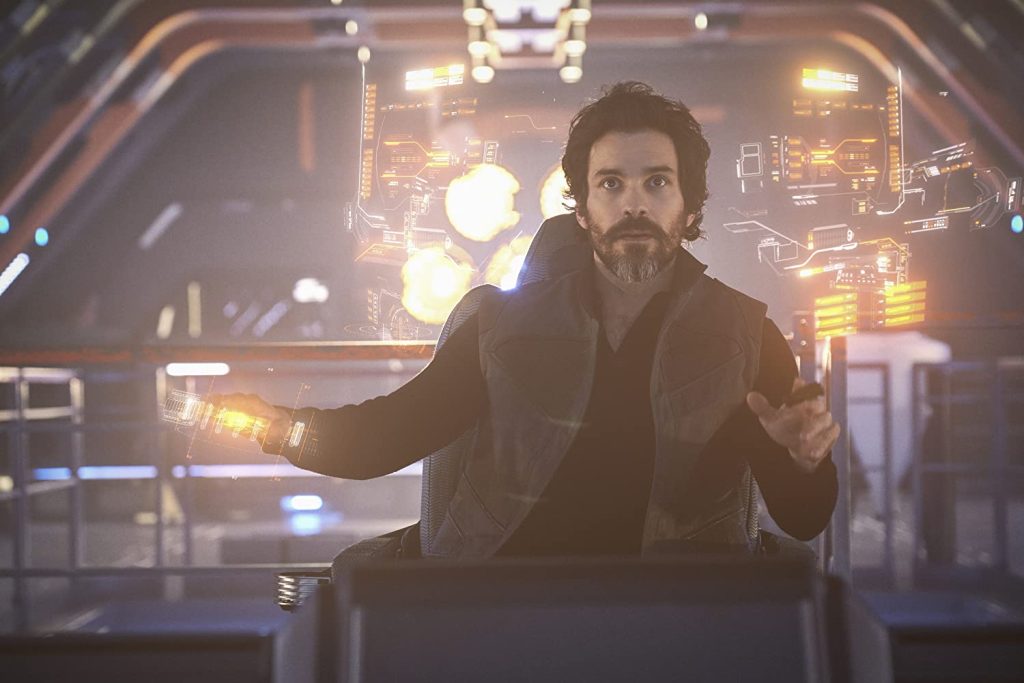
It isn’t just the acronyms that reveal the writing to be terrible. So much of what we see is either purely there for melodrama or makes no sense in any context. In one example, Raffi tells Picard that she is only hitching a ride with him to get to another planet. Unbeknownst to the rest of the crew, her son lives on that planet and she is planning on making amends with him and living there happily ever after. How did she initiate this? By surprising him in the waiting room of a hospital where his wife is giving birth. Seriously, she and the writers thought this was a good idea. Upon seeing her, her son snarls contempt and exposition at her and she slinks back to Rios’ ship and hides in the bathroom. The result of this scene is two characters who are entirely unsympathetic, and an audience left very uncomfortable.
In another example, after manipulating Soji for two weeks with his mysteriousness and his penis, Narek uses a magical Romulan dream-recalling ceremony to trick her into revealing the location of the android colony. Not the exact location mind you, but a vague description of a planet involving lightning. With that revelation, Narek traps her in a room and releases a poison gas to kill her.
Naturally, she escapes almost immediately because the gas triggers her inner android. This scene would have worked if it was followed by Picard and crew racing the Romulans to the colony. Instead, it is followed by Narek following Picard and crew by tracking Dr. Jurati by way of a tracking device she was forced to swallow by Oh before she ever joined Picard’s crew. So, if Narissa and Narek could already track Picard, why bother with the whole surreptitious plan of manipulating Soji? Wouldn’t it have been far easier and less conspicuous to let Picard find Soji (maybe even help from the shadows) and just follow them?
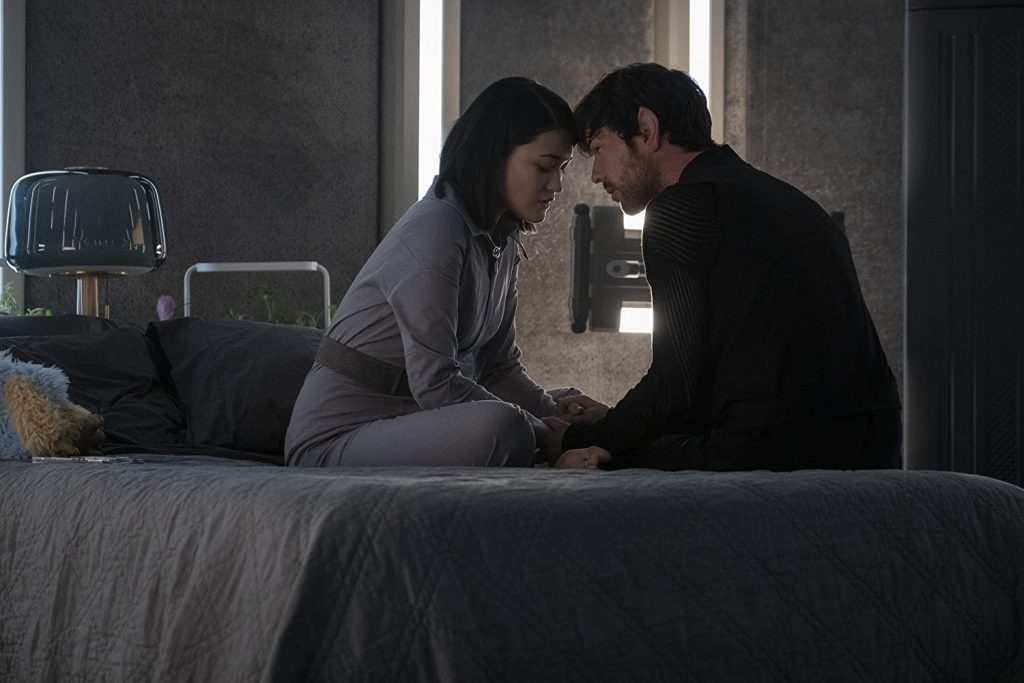
Then, there are the million other things that don’t make sense. After banning synthetics, the colony was established in secret, so why were Soji and Dahj sent out at all? And why were they not aware they were androids? And why didn’t the colony have much better defenses? If the Romulan cult was afraid of the robopocalypse, why would they intentionally cause an army of androids to start killing everyone? For that matter, how were the killer androids stopped in the first place? And so many, many (many) more.
The failings of this show were made painfully clear by Stewart mustering every ounce of his considerable talent to carry the show while standing next to clearly inferior actors. The familiar Jean-Luc is there, but fails to blend into the dystopian context.
My wife, a huge TNG fan, was especially disappointed by the complete disregard for the Star Trek aspirational spirit. With Captain Picard at the helm, the crew of The Enterprise D challenged our nerd brains to imagine what humanity could be: benevolent cooperation, optimistic curiosity, and genuine care for other living beings. Instead, Picard throws it back in our face, shines a lens flare on it, and says “eat up this stupid contrivance, you brainless couch blobs.”

The only reason we stuck with this show to the end was for the occasional glimpses of light that were callbacks to TNG and a misplaced hope that the show would miraculously redeem itself. Besides Data being sprinkled into a couple of dream sequences, Riker (Jonathan Frakes) and Troi (Marina Sirtis) feature prominently in episode 7 (and Riker again in the finale), as does Hugh (Jonathan Del Arco), a former Borg from a couple of old TNG episodes. Seven of Nine (Jeri Ryan) is also featured fairly prominently, for those Voyager fans out there.
When the scenes feature only the old characters, the show starts working again, if only because the actors seem not to have missed a beat from the old days (even Ryan). Besides that, there is no good news. There is zero chance we will expose our son to this travesty, let alone watch the already greenlit second season of what might be more appropriately named CSI: Spaceforce.
Rating: Ask for one hundred dollars back from CBS, even if you did the free trial. Calling it Star Trek doesn’t make it Star Trek.